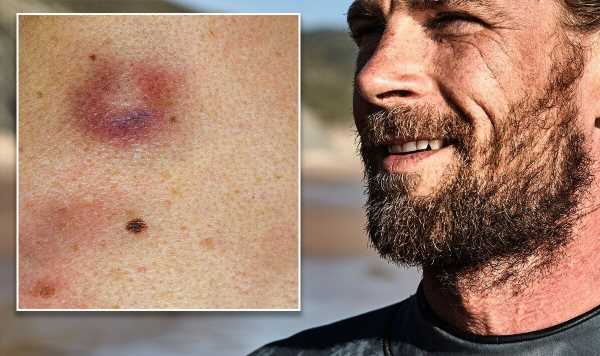This Morning: Jon Courtenay recalls skin cancer diagnosis
We use your sign-up to provide content in ways you’ve consented to and to improve our understanding of you. This may include adverts from us and 3rd parties based on our understanding. You can unsubscribe at any time. More info
Figures from the NHS suggest one in five people will develop skin cancer in their lifetime.
Cases have been rising steadily in recent years, reaching record highs.
Experts say these figures will only rise further.
Dr Tanya Bleiker, President of the British Association of Dermatologists, said: “We are fast approaching a quarter of a million cases a year in England.”

Dr Bleiker added: “While more needs to be done to prevent skin cancer, we also need to increase the resources available to tackle the rise.”
There are two types of skin cancer, melanoma and non-melanoma.
Non-melanoma is the most common and least dangerous of the two.
The NHS describes this form of skin cancer as one “that slowly develops in the upper layers of the skin”.
Meanwhile melanoma is a type of skin cancer where the disease has spread to other organs.
Symptoms of melanoma include the change in appearance of an existing mole or the appearance of a new one.
The NHS says melanomas “are uncommon in areas that are protected from sun exposure”.
Furthermore, melanomas normally have an irregular shape and more than one colour; moles are generally ovular with a smooth edge, and consistent colour.

The NHS recommend seeing a GP as soon as possible if a mole is:
• Getting bigger
• Changing shape
• Changing colour
• Bleeding or becoming crusty
• Itchy or sore.
The sooner a GP is seen the sooner the cancer can be treated and the greater the likelihood of survival.

The mantra of getting checked quickly is one applicable to all cancers.
Even if a lump, bump, pain, or an ache does not turn out to be cancer, it is far better to go through the rigmarole of getting it checked than leaving it and finding action could have been taken sooner.
Statistics say one in two people will get cancer in their lifetime.
More information about skin cancer and other variants of the disease are available on the NHS website.
Source: Read Full Article
